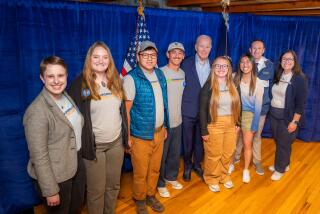Fast Forward : Catching Up With 1990’s Newsmakers : Environment: There will be no Earth Day in 1991, says Chris Desser. ‘Our time is better spent working on the issues.’
- Share via
Chris Desser is still explaining to people that there isn’t going to be another Earth Day extravaganza, at least not in 1991.
“It was never our intent to establish an annual holiday,” she says. “The idea was to launch a decade of environmental activism.”
Desser, 36, is winding down her job as executive director of Earth Day 90, the April 22 global binge of tree-plantings, recycling rallies, rain-forest pageants, nature walks, TV specials, trash-ins, teach-ins and assorted other earth-friendly activities.
But there is no official encore in 1991, she says.
“The intent from the start was to focus public attention on the problems we are facing as a planet,” says Desser. “It was to be a massive education effort that would culminate on April 22 and galvanize a whole generation of environmental activists.”
The 1990 event, which marked the 20th anniversary of the first Earth Day, was organized out of national headquarters in Palo Alto with 15 regional offices, a staff of 80 and thousands of volunteers.
Earth Day 90 left a string of impressive statistics: An estimated 200 million participants in 140 countries. In the United States, campus coordinators in 130 areas overseeing activities at more than 2,000 colleges. Environmental lesson plans distributed to 120,000 K-12 schools. More than 100 cities enrolled in a project to develop local environmental planning ordinances.
And such a tidal wave of media attention that purists hinted that media hype was overshadowing the real needs of a deteriorating planet. Still, Desser thinks the massive effort made its point: “I am pleased with the Earth Day job. Not that we took care of all the issues by any means, but I think it made a big dent in peoples’ consciousnesses.”
The timing was right, she says. “We didn’t do it alone--we stood on the shoulders of a whole bunch of environmental groups who have been there for a long, long time, but we went beyond that. For many people Earth Day 90 now is the single event they will be able to point to when they talking about waking up to the environmental crisis. And the things people tell me about how it affected kids are spine-chilling: Suddenly environmental consciousness is a part of their lives.”
In summary, she says, “We really wanted to change the way people think. I think we got a lot of things started.”
Her board of directors, mostly people involved in heavy-hitting environmental projects, have gone back to their work.
Desser has moved the office to San Francisco and, with one assistant, Blaine Townsend, is dealing with the other inheritance of Earth Day--a substantial debt. Earth Day sponsors raised about $2.2 million toward the $3-million cost. The debt is being retired mainly through art sales, she says: “Artists Robert Rauschenberg and Ed Ruscha had created Earth Day lithographs which were produced in a limited edition.” For the last eight months she has been selling the lithographs, often to Earth Day creditors “who have been able to develop an interest in art.”
The winding-down process is frustrating in many ways, she says, because the office still gets thousands of letters and doesn’t have the resources to respond. Teachers across the country want copies of the Earth Day environmental lesson plan; many correspondents just want generic environmental information.
And she gets lots of calls asking “Why don’t you organize another Earth Day?”
Desser, a San Francisco lawyer who had been focusing on land-use issues on the city attorney’s staff, won’t return to that job, but will concentrate on full-time environmental work.
“I couldn’t go back to doing anything else,” she says. “These issues have become too important to me.”
She is considering several options, but organizing a 1991 Earth Day is not among them.
“If it’s an annual holiday, the issues become trivialized and the advertising benefits become emphasized,” she says.
“Most holidays are looking back, but we had one that was looking ahead. Now our time is better spent working on the issues themselves.”
More to Read
Sign up for Essential California
The most important California stories and recommendations in your inbox every morning.
You may occasionally receive promotional content from the Los Angeles Times.













